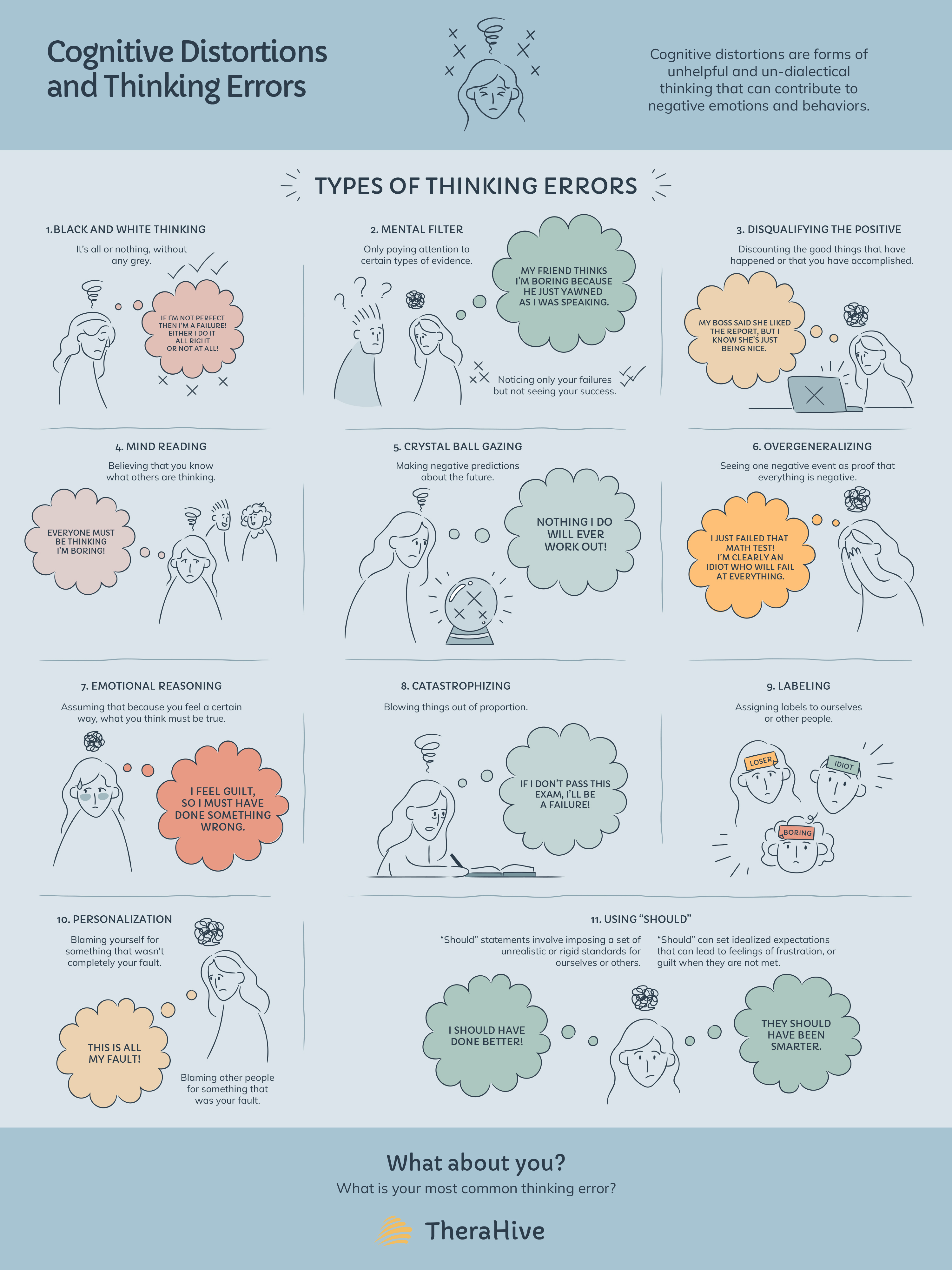In traditional CBT, cognitive distortions are recognized as inaccurate thoughts that skew our understanding of reality. Techniques in CBT often involve identifying and challenging these distortions to align closer with a more accurate and less biased perspective.
For example, ‘Alex’ who often encounters the cognitive distortion known as catastrophizing—where an individual expects the worst possible outcome in a situation. Alex feels a mild pain in his stomach and immediately thinks, "This must be something serious. What if it's a life-threatening illness?" In a CBT session, the therapist would guide Alex to recognize this pattern of catastrophizing as a cognitive distortion. They would then work together to examine the evidence for and against his catastrophic thought by asking questions like, "What are some more likely explanations for your stomach pain?" and "What would you tell a friend who had the same worry?"
This process helps Alex learn to challenge the validity of his initial fears and consider other, less dire possibilities, such as minor indigestion or muscle strain, leading to a more balanced and less anxiety-driven perspective.
CBT emphasizes the process of questioning the validity of distorted thoughts and restructuring them into more balanced ones. DBT, on the other hand, approaches these distortions with a unique perspective. Rather than labeling thoughts as distorted or irrational, DBT focuses on understanding why a thought might make sense based on a person’s history and current context.
For example, consider ‘Emma’ who often experiences intense feelings of rejection at the slightest hint of criticism from others, leading to overwhelming sadness and isolation. Instead of labeling these thoughts as distorted or irrational, a DBT therapist would explore with Emma why these thoughts might make sense, given her history and current context. Perhaps Emma grew up in an environment where she received frequent harsh criticism, conditioning her to expect negative feedback as deeply personal and devastating.
By understanding the origins and triggers of her reactions, Emma and her therapist can work on strategies that acknowledge her feelings while also helping her develop a more resilient and balanced response to criticism. This approach reflects a fundamental belief in DBT: all thoughts have a logical foundation when viewed in the light of personal experience and context.
Types of Cognitive Distortions
Cognitive distortions come in many forms—some subtle, some more obvious. Here’s a visual overview of 10 of the most common types.

The Role of Dialectics and Mindfulness in DBT
DBT incorporates the concept of dialectics, which involves holding two seemingly opposite perspectives at once and finding a balance between them. This encourages cognitive flexibility, allowing individuals to see multiple sides of a situation and to escape the binary thinking often found in cognitive distortions, such as "all-or-nothing" or "black-and-white" thinking.
Mindfulness, another core component of DBT, teaches individuals to observe and describe their thoughts and feelings without judgment. This skill is particularly useful in managing cognitive distortions by fostering an enhanced awareness of the moment, which in turn helps individuals recognize and assess their thought patterns more effectively.
Contrasting Approaches: DBT vs. CBT
While both therapies aim to increase cognitive flexibility, DBT does not prioritize identifying a single "true" thought but rather broadens the perspective to evaluate the effectiveness and helpfulness of thoughts. This is reflective of a broader goal in DBT: to accept and validate thoughts as they are, while also recognizing their impact on behavior and emotions.
CBT, while also tending to emphasize cognitive flexibility more than in the past, traditionally focuses on identifying distortions directly and restructuring thoughts towards more objective, less biased interpretations.
The Advantages of DBT
DBT offers several advantages particularly beneficial for those who might feel invalidated by other therapeutic approaches. By not directly challenging thoughts as distortions, DBT can provide a more accepting and compassionate space for individuals to explore their thoughts without feeling judged. This can be particularly empowering for individuals dealing with highly emotional or sensitive issues.
Moreover, the dialectical approach helps create a richer understanding of problems, fostering a synthesis of different perspectives. This can lead to more sustainable changes in thought patterns, as individuals learn not only to identify less helpful thoughts but to understand their origins and function.
Both DBT and CBT provide valuable tools for managing cognitive distortions. DBT's strengths lie in its emphasis on understanding and validating personal experiences and thoughts, fostering a nonjudgmental awareness of the moment, and promoting balance through dialectical thinking. For those seeking therapy that accommodates a broader view of their experiences without directly challenging their validity, DBT may offer the supportive environment needed for effective change.
{{promo-banner-1}}


.svg)


.svg)
.svg)
.svg)

